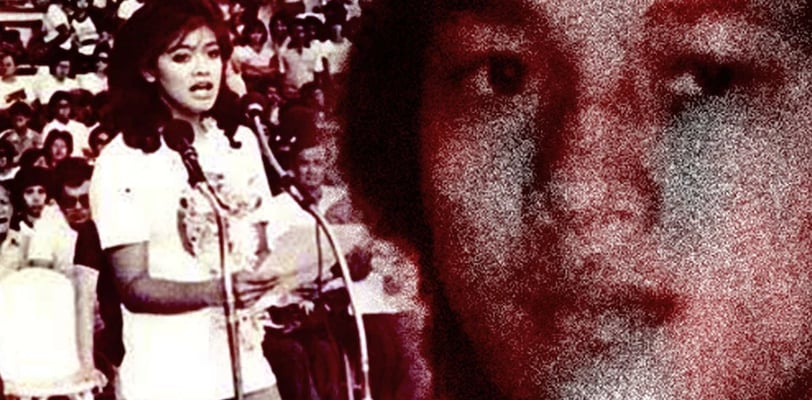The Torture and Death of Archimedes Trajano: Imee Marcos’ Role and the Quest for Justice
This blog revisits the story of Archimedes Trajano, a 21-year-old student who dared to question Imee Marcos during Martial Law—and paid for it with his life. Drawing from court records and firsthand accounts, this post aims to educate the younger generation on what happened, why it matters, and how justice was denied.


There’s a heaviness that comes with writing this.
Because how do you talk about the torture and death of a 21-year-old student—without sounding like you’re riding on the memory of someone who suffered?
But I keep seeing his name.
Every time someone brings up Imee Marcos—on social media, in casual conversations, in comment threads—someone always drops it:
“What about Archimedes Trajano?”
And yet, so many don’t know who he was.
What happened to him.
Or why his name continues to echo, quietly, under the noise of those telling us to forget the past.
This blog is for those who don’t know.
For the younger generation who never heard his story. For anyone who wants to understand why his name won’t go away—because it shouldn’t.
And if you’re wondering whether this is political—yes, it is.
But it’s not about parties.
It’s about a question he asked in 1977.
A question that cost him his life.
This post is written with deep respect.
For Archimedes “Archie” Trajano.
For his bravery.
And for the truth.
Let’s begin.
Who He Was—and What Happened to Him
Archimedes “Archie” Trajano wasn’t a rebel.
He wasn’t even political in the way people think of activism today.
He was a student.
Twenty-one years old.
Enrolled at the Mapúa Institute of Technology.
Just a young man living under Martial Law, at a time when asking questions could be seen as an act of defiance
(Wikipedia).
The year was 1977.
Ferdinand Marcos had been ruling under Martial Law since 1972.
The press was silent.
The courts were powerless.
And students who spoke out—many of them never came home
(Canvas.ph).
Archie was one of those students who still believed he had a voice.
And he used it.
On August 31, 1977, he attended an open forum at Pamantasan ng Lungsod ng Maynila.
Speaking at the event was Imee Marcos, then 21 years old—just like Archie—serving as National Chairman of the Kabataang Barangay, the government’s youth organization
(Kasarinlan Journal).
During the Q&A, Archie stood up.
He asked Imee a question.
“Must the Kabataang Barangay be headed by the president’s daughter?”
“Would she even be in that position if not for her last name?”
It was a simple question.
Direct.
Pointed.
But not disrespectful.
That was the last time he was seen alive in public.
Witnesses say Imee's bodyguards dragged him out of the room right after the question
(Vera Files).
No explanation.
No due process.
No debate.
He didn’t vanish in the dead of night.
He didn’t go underground.
He was taken from a public university, in the middle of a forum, in front of students and faculty.
Imagine that.
Imagine earning the ire of the daughter of the president—just because you asked a legitimate question.
How They Returned His Body
Two days after the forum—on September 2, 1977—Archimedes Trajano’s body was found in Manila.
He had been missing since the day he asked a question at a school forum.
Now, he was lying on a morgue table.
His face was swollen.
His body was bruised, twisted, and broken.
He had been tortured.
The damage was unmistakable—deep bruising, blunt force trauma, his face and torso mangled beyond recognition
(Kasarinlan Journal).
They didn’t try to hide it.
They dumped his body.
As if he meant nothing.
But someone came looking.
His mother, Agapita Trajano, was called to identify him.
She later said:
“He was covered in a white sheet, lying on a table. And when I opened the sheet... I saw him black and blue... I could not talk... nothing... but I think my heart hardened. I said, My God, why him?”
(ABS-CBN)
She didn’t scream.
She didn’t cry in that moment.
She just stood there, seeing what had been done to her son.
This wasn’t random.
This wasn’t a mistake.
It was calculated.
A message.
You don’t question power.
Not in public. Not in front of others. Not even once.
What the U.S. Courts Said About Imee Marcos’ Role
In 1986, after the Marcoses fled to Hawaii following the People Power Revolution, Agapita Trajano did what the courts in the Philippines never gave her a chance to do.
She filed a case.
In the U.S. District Court of Hawaii, she sued Imee Marcos for the wrongful death, kidnapping, torture, and human rights violations committed against her son, Archimedes
(Vera Files).
Imee Marcos never appeared in court.
Not once.
In May 1986, a default judgment was entered against her.
But it didn’t end there.
In 1991, she tried to get the judgment overturned, claiming she hadn’t been served properly.
But the court disagreed.
So the case moved forward—based on the evidence already filed
(Kasarinlan Journal).
The court’s findings were clear.
Imee Marcos controlled the military intelligence personnel who abducted and tortured Archimedes.
She knew he was going to be tortured.
She caused his wrongful death through agents acting under her authority
(University of Minnesota Human Rights Library).
She didn’t deny the torture.
She didn’t deny the death.
Instead, her legal team argued that U.S. courts had no jurisdiction over acts committed in the Philippines
(ABS-CBN).
She argued immunity—not innocence.
In 1992, the U.S. Court of Appeals for the Ninth Circuit upheld the ruling.
They declared that Imee Marcos was responsible for the torture and wrongful death of Archimedes Trajano.
They called it a violation of the law of nations—a breach of international human rights law.
The court awarded $4.16 million in damages and attorney’s fees to Agapita Trajano
(Kasarinlan Journal).
That judgment still stands.
It happened far from home.
In a courtroom halfway across the world, a grieving mother found what no Philippine court ever gave her:
Acknowledgment.
Why Justice Was Denied in the Philippines
After winning in a U.S. court, Agapita Trajano returned home and tried to do what any mother would do:
Make the justice count where it mattered most.
She filed to enforce the U.S. judgment in the Regional Trial Court (RTC) of Pasig, under Civil Case No. 63337
(Vera Files).
Again, Imee Marcos didn’t show up.
Just like in the U.S., she ignored the court.
And just like in the U.S., the RTC declared her in default.
But her lawyers weren’t out of moves.
They didn’t challenge the ruling itself.
They didn’t argue she was innocent.
They questioned the summons.
They claimed the court papers had been delivered to the wrong address:
Alexandra Homes, a condo unit linked to her partner, Tommy Manotoc.
According to her legal team, she didn’t live there—she lived in Singapore.
The Court of Appeals didn’t buy it.
In 1997, they ruled that Alexandra Homes was a legitimate residence and the summons was valid.
But Imee brought it higher.
She filed a petition with the Supreme Court.
And this time, she won.
In 2006, Associate Justice Presbitero Velasco ruled in her favor, saying that the Alexandra Homes address was “merely an allegation.”
He said more effort was needed to locate her
(Philippine Supreme Court Decision; Kasarinlan Journal).
So the default judgment in the Philippines was voided.
And the case was dropped.
No retrial.
No damages paid.
No accountability.
Even after a U.S. court named her responsible for torture and death, nothing happened here.
Because power, when it lives next door, is harder to touch.
Where Is Imee Marcos Now—and What Has She Said?
After everything that happened—
After the U.S. court ruling,
After the public records,
After the silence in Philippine courts—
Imee Marcos went on to build a successful political career.
She served as Governor of Ilocos Norte from 1998 to 2007, then as Congresswoman from 2010 to 2019, and in 2019, she was elected Senator
(Wikipedia – Imee Marcos).
There was no public reckoning.
No acknowledgment of her legal record abroad.
No mention of Archimedes Trajano during campaigns.
Just speeches.
Slogans.
And votes.
In August 2018, on the anniversary of Ninoy Aquino’s assassination, she made a remark that drew heavy backlash:
“The millennials have moved on, and I think people at my age should also move on as well.”
(ABS-CBN)
Youth groups quickly responded:
“The millennials, the youth in general, have not moved on and we will never move on from the Marcoses’ crimes against the Filipino people.”
When asked whether her family would consider apologizing, she said:
“What I’ve heard is that there are calls for an apology tantamount on admission, which we would never do.”
“I don’t know what we should admit to.”
That’s what she said.
Not what happened.
She talks about moving on, but never about facing what came before.
And so, she remains in office.
Sits in Senate hearings.
Proposes laws.
While the mother of a tortured student—
A mother who fought quietly, persistently, for years—
died without ever seeing justice carried out.
This isn’t about refusing to let go of the past.
It’s about how easily we let it fade when the people involved still walk among us—
and are once again running for another term in the Senate.
This time, she’s doing it aligned with the Dutertes—
the same forces pushing to rewrite history,
silence dissent,
and return the country to fear dressed up as strength.
Why This Story Still Matters
Every time Imee Marcos runs for office,
Every time she appears on TV,
Every time her name trends—
Archimedes Trajano’s name follows.
Not because of propaganda.
Not because of rumor.
Because of court records.
Because of what the law said.
Because of what was done—and what was never answered for.
But here’s the part that stays with me:
A lot of people don’t know this story.
Some were never told.
Some were told it wasn’t true.
Some were taught to laugh it off, like history is just a meme war waiting for the next viral punchline.
And that’s the real danger.
Not that they deny the truth.
But that they forget it altogether.
That’s what power wants—not forgiveness, but forgetfulness.
And it’s easy to forget when the world moves on.
When the people responsible are on billboards, not behind bars.
When schools avoid the topic.
When news cycles move too fast.
When no one stops to ask:
“Wait… who was Archimedes Trajano?”
He wasn’t a soldier.
He didn’t have a gun.
He wasn’t a rebel leader.
He asked a question.
That’s all.
And they made sure he never asked another.
So no, this post isn’t for clicks.
And no, it’s not written in anger.
It’s written because someone has to keep telling the story—especially for those who were never given the chance to hear it.
Because if they won’t be held accountable,
Then we’ll keep remembering for them.
Contact us
subscribe to morning coffee thoughts today!
© 2024. All rights reserved.


